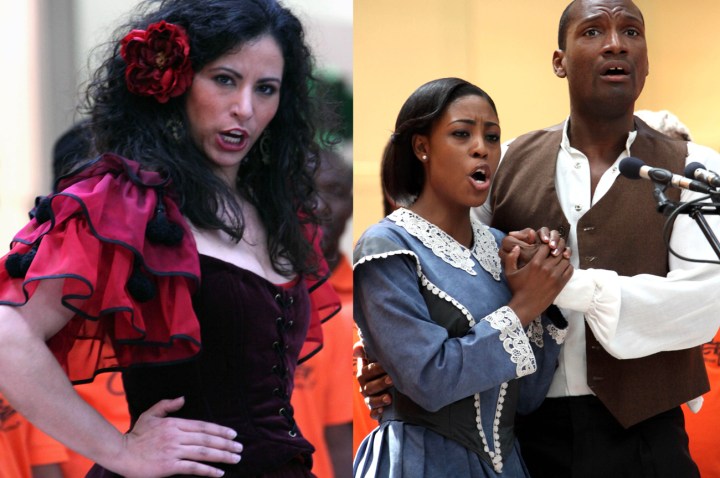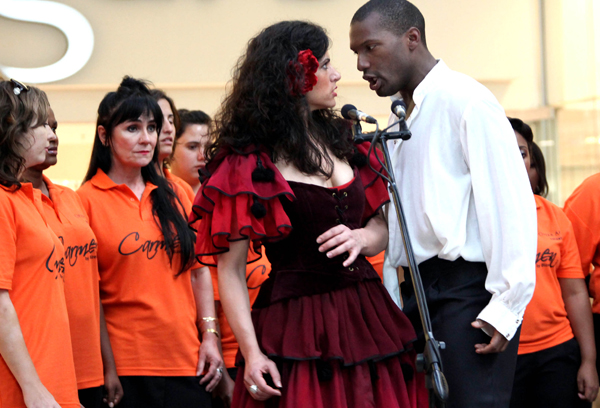Media
It ain’t over till the drop-dead gorgeous woman sings – ‘Carmen’ in Soweto

Opera, once seen from Brazil to Braamfontein, as the defining statement of colonial superiority, has leapt the great Valkyrian chasm dividing rulers from the ruled, and separating the races. It is now a reinvigorated, stereotype-smashing and fully integrated phenomenon that has changed the very look and sound of classical performing arts. You could say opera’s gone black to the future. By J BROOKS SPECTOR.
Many had always thought of opera as featuring ample ladies wearing Viking helmets and draped in large sheets, holding spears and with voices that warbled up and down the scale until the a wine goblet shattered. Opera was one of those things that belonged to the swells in the dress circle, the Italian mafia friends of Don Corleone in Sicily, or even the Groucho Marx classic, “A Night at the Opera”.
This month and into April, audiences in Cape Town, Pretoria, Durban and Johannesburg will have the chance to see and hear “Carmen” by Georges Bizet – conceived and staged by two different companies. This is definitely not one of those caricatures of opera. In the past 135 years, “Carmen” has become one of the world’s most popular shows. It regularly ranks among the top four most-frequently performed operas around the world. This is despite the fact that critics roundly trashed it when it was first produced at the Opera Comique in Paris in 1875 because of its vulgar, grubby, near-pornographic storyline.
In brief, Carmen lives hard and dies young as a gypsy girl who works in a cigarette factory in Seville, Spain. She has a knife fight with co-worker and is arrested by the local army guard detachment. One poor sap of a trooper, Don Jose, falls in love – or lust – with her and she cons him into letting her go free. He follows her off into the hills to join with her smuggler friends – and she cheats on him. Naturally. Humiliated, his army career now in ruins, his naïve girl friend back home driven near to despair by his behaviour, Don Jose kills Carmen out of rage, love, lust and jealousy. Now doesn’t that just sound exactly like one of those soapies on TV?
But “Carmen” could also be the perfect 21st century story every HIV/Aids campaigner, every anti-tobacco activist should adopt tomorrow. This is a project the department of health should sponsor. Besides the great music, “Carmen” has two big messages: Cigarettes are really bad for your health – and concurrent, multiple sexual partners will definitely kill will you!

Photo: Noah Stewart and Christina Nassif perform at Maponya Mall, 26 February 2011.
Is this really the story line for hefty women in marquee-sized dresses and Viking helmets with voices to shatter your wine glass – or something very different?
In the past few years, there has actually been a revolution in the way opera is staged. Singers now really have to look, act and move like their characters. Carmen now has to look like the kind of girl who would drive a military man wild, in addition to singing really well. Opera Africa’s current pairing of the young American visiting singers, Christina Nassif and Noah Stewart, together with young South Africans like Kelebogile Boikanyo and Audrey Loedwyk, seems designed to give just that sensibility.
And sets must now either offer chilling psychological insights or be inspired by outdoor concerts. The set for the Johannesburg/Pretoria “Carmen” has a distinctly Freudian texture in which a cigar is not just a cigar. Along similar lines, I once saw a production of Puccini’s “Turandot” that was clearly inspired by “Star Trek: The Next Generation” and the USS Enterprise’s battle with the Borg.
Before the creation of the new opera companies in South Africa, generations of South Africans knew opera as something the four provincial performing arts councils – Pact, Capab, Pacofs and Napac – used as a kind of cultural club. Club – as in weapon. Opera was a way of sending a brutal message to lesser people from their rulers: opera and classical music are our heritage, these buildings where it is performed are our buildings, and none of this is yours – now go away and sing “Daar Kom die Alabama” or “Mama Thembu’s Getting Married Tonight” somewhere else. Or else. The performing arts council versions of opera often featured famous, but somewhat over the hill, European singers and overly florid costumes, sets and staging. The kind of thing that often elicited a gasp when the curtain went up, regardless of the singing.
Of course, the story was more complex than that. Opera was a weapon from the other side of this nation’s racial divide. My record collection (remember, those thin black vinyl disc things) includes some 40-year-old recordings by the late Khabi Mngoma’s Ionian Choir. On the A-side are traditional African songs and hymns arranged for choir, but on the reverse are oratorio and operatic choruses from Handel’s “Xerxes” and “The Messiah”, and even Verdi’s “Il Trovatore”.
Watch: Carmen at Maponya Mall, Soweto.
True, the Ionian Choir and others like it didn’t produce full-staged operas, but they had large followings in townships and beyond for their concert performances. Parallel to these performances were massed, multi-choir programmes that sang the oratorio, “The Messiah”, and similar works to large, but alternatively black or white, audiences in Johannesburg. As Durban musicologist Chris Cockburn wrote in “Composing Apartheid”: “In April 1959 several performances of Handel’s ‘Messiah’ took place in the City Hall in Johannesburg which attracted unusually widespread publicity and attention. An estimated 11,000 people attended and according to one account, ‘Johannesburg music lovers went mad with delight’. The performances were considered sufficiently significant to warrant newsreel coverage, and were so successful that they initiated a series of annual performances stretching over the following decade….
“At this juncture, a black choir and soloists performing one of the greatest icons of Western classical music with a white orchestra and conductor, to (separate) black and white audiences in the heart of (white) Johannesburg, was entering exceptionally complex and fraught ideological territory.”
And even further back, in 1950s Cape Town, Italian conductor Joseph Manca was the artistic force behind the establishment of the Eoan Group’s opera programme that, despite a dire scarcity of resources, performed enormously ambitious programmes for Cape Town audiences – although not without some controversy because of the Eoan Group’s willingness to exist and perform as a racially segregated ensemble. Regardless of the controversies, they even managed to bring this company to Johannesburg on tours that included several full-dress operatic favourites, performed in repertoire, at the then-segregated Civic Theatre. But, over time, tightening apartheid strictures made the Eoan Group’s existence increasingly problematic and a more rigorously segregated Civic made touring there ever more difficult for such a group.
Eventually, the cumulative effect of apartheid law kept much classical music, and most especially opera, beyond most of the country’s African, Indian and Coloured populations – both as audience members and as trained performers and professionals. By the late 1980s, South African liberation movements and their local stand-ins like the sometimes eccentric Transvaal Interim Cultural Desk had labelled opera, ballet and classical music as discredited “Eurocentric” work that needed to be driven out of the cultural temple, in contrast to ostensibly more authentic jazz and indigenous music and performance. Opera and classical music stood accused of being the preserve of those despised provincial arts councils that had supported the cultural delusions of an apartheid state.
In the years after 1994, the old-era arts councils were eventually shuttered and their vast and expensive inventories of major opera productions were broken down. For many, the putative final decline of a western classical musical tradition in South Africa became world news with word that the SABC Orchestra, now renamed the National Philharmonic, had lost its government subsidies and was being closed down. The symphony was dead – and opera and ballet were on life support and headed down the hall to the morgue as well. Or not, perhaps.

Photo: The African-American tenor Noah Stewart, as the soldier turned smuggler Don Jose, partners the Spanish-Lebanese-American Christina Nassif as Carmen in Opera Africa’s ‘Carmen’- now being performed at the State Theatre and transferring to the Joburg Theatre on April 1 for its second run.
In Cape Town, a new company was created on the wreckage of the old order, but this time built around the idea of creating an opera studio school to work with the University of Cape Town’s music college and provide a conveyor belt of training to take young voices on through a comprehensive process to fully staged works. In Pretoria, a somewhat similar impetus led to the establishment of the Black Tie Ensemble, bringing young voices into a training programme that would produce a growing roster of vocalists who could find work in operatic productions. And a third group, Opera Africa, began in Durban in 1994 at the encouragement of Khabi Mngoma, but later moved to Johannesburg. Opera Africa was also created using the model of a rigorous training of young talent and its gradual insertion into full operas with an energising mix of domestic and foreign lead singers, conductors and directors.
Because of this new musical energy, South Africa has – paradoxically – become home to a new generation of young black classical singers of astonishing quality, singers like Pretty Yende, Kelebogile Boikanyo, Angela Kerrison and Tsakane Maswanganyi, among many others. And singers from a slightly earlier generation like Sibongile Khumalo (Khabi Mngoma’s daughter) found roles in stunning new works like the opera “Princess Magogo,” commissioned by Opera Africa, and in the oratorio “Ushaka” both composed by James Mzilikazi Khumalo.
The irony is that despite this growing flow of black, classically trained singers, it is a near-Sisyphean task to build self-sustaining, broad-based, new audiences for this music. Too many black South Africans seemingly remain convinced opera is for rich, white folk and not for them, despite a complex South African musical history that really argues otherwise. And just the other day, I heard about the opposite version of prejudice – white people who insisted that opera isn’t for black people – and they just shouldn’t sing it. Well, Kathleen Battle, Simon Estes, Leontyne Price, Marian Anderson, Todd Duncan and Jessye Norman and their multitudes of fans around the world would all be surprised by such outbursts. Taken to its logical, but absurd conclusion, this would argue that the only people would should be allowed to sing in an opera would be short, stubby Italian men – even women would often be kept off the stage in place of those castrati who hogged the limelight until the 19th century.
Today’s audiences are now so thoroughly trained by television, theatre or high impact, live music performances that those dull, static, over-stuffed stagings of bygone days have lost their appeal – even to real opera lovers. To embrace this sensibility, for example, when Opera Africa put on “Aida” a couple of years ago, they had a real cheetah on stage. The people in the first couple of rows of seats surely had more than the usual frisson of excitement beyond the music. And when they produced “La Traviata” the year before that, the Parisian demi-monde was transformed into contemporary Johannesburg’s mink-and-manure suburbs, complete with tenderpreneurs. As for “Carmen”, be prepared to be tempted into abandoning your family, job and hum-drum existence to follow an illusion of love and adventure. DM
For more, see:
- History of the Joburg Theatre;
- Cape Town Opera website for information on Cape Town performances;
- Opera Africa website for information on Pretoria and Johannesburg performances;
- More on Carmen here;
Main photo: Cristina Nassif as Carmen, Kelebogile Boikanyo as Micaëla and Noah Stewart as Don José Performing at Maponya Mall, Soweto, on 26 February 2011.


















 Become an Insider
Become an Insider